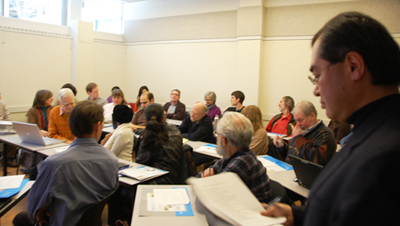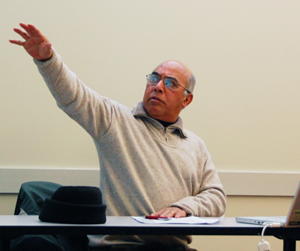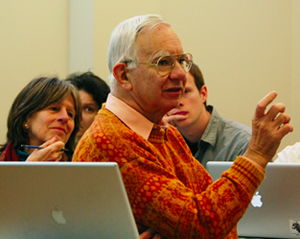Over 25 people from throughout the institute, as well as interested educational technology experts from neighboring institutions, attended OEIT's open discussion on E-Learning on Jan 25th.

Hosted by Senior OEIT Strategist Toru Iiyoshi, the open session was an exploration of the possibilities and potentials of technology-enabled education at MIT.
Faculty/Student perspective
Vijay Kumar, OEIT director and MITCET executive officer, shared the responses gathered from faculty and students in regards to MIT's critical educational values, cultures, and priorities, and how those tangibles and intangibles can be supported and enhanced by technology. Responses indicated that faculty/student interactions were deeply valued, with faculty seen as the limiting resource when exploring the potential for scalability.

Efficiency and effectiveness were also highlighted, as well as the notion that technology adapts to the pedagogy (rather than visa versa).
Opportunities
Some of the affordances that E-Learning presents are tools which support different learning styles, as well as the use of technology to facilitate global interactions. In addition, E-Learning technologies prompt a redefinition of the educational experience wherein the independent learner is placed at the center, instead of the traditional lecture/recitation format. This signals a change in orientation: from teaching content to supplying hands on research experience, a modality that MIT is well-equipped to support.
Looking Ahead
The Council on Educational Technology plans to identify substantive technology-enabled educational experiments to start in Fall 2011. Between now and then the council will be working to engage with the faculty on appropriate programs. Cec D'Oliviera, Executive Director of OCW, highlighted the different ways that innovation can arise, either at the grass-roots level where transformation is localized and delimited, or from a more 'top-down' orientation where the effect is felt institute-wide.
David Pritchard demonstrated a project his research group is working on, oriented towards more modular learning and peer to peer instruction. By using technology as a device for discourse, student to student interactions can be fostered where different points of view are explored and debated. Says Pritchard: "Between two students, the truth will win out".

Haynes Miller, the creator of Mathlets tools, remarked on the potential for social isolation that E-Learning may bring. When Mathlets were first launched, they had to be used in a computer cluster, and it forced students to work together, thus fostering community. Now that Mathlets are java based, individuals work in isolation at their own computers.
Other participants noted the plethora of educational tools already proliferated about campus: STAR, iLabs, Mathlets, NB, SpokenMedia, HyperStudio, etc. Some of the challenges of the future will be to fully integrate these existing tools into an E-Learning environment.
Continue the conversation!
Log in to the OEIT website, create your account, and let us know what you are thinking....
- Molly Ruggles